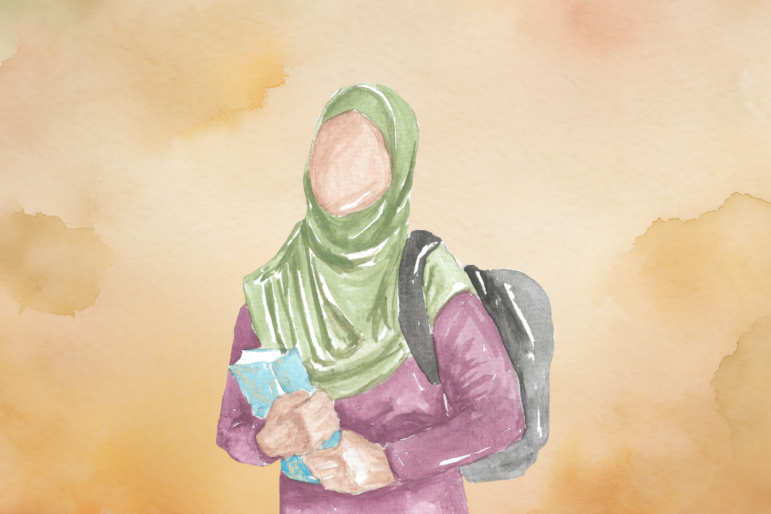Empowering Mothers to Lead: Women Peace Team Breaks Barriers in Ba’aj
In a community where women have long been excluded from decision-making, mothers are breaking barriers and leading a movement for change. What started as simple meetings between teachers and mothers has evolved into a powerful committee, ensuring girls' education and women’s voices are no longer overlooked.
In Ba’aj, West Ninewa, it is customary for women to be excluded from decision-making spaces. Traditional gender norms limit women to the privacy of the home, while cultural barriers make it difficult for them to engage with male leaders that hold power.
While you may have heard of or be familiar with Parent-Teacher Associations (PTA), in Ba’aj, only fathers are invited to participate in the meetings. However, they’re rarely able to attend due to work obligations. In the few occasions that they do show up, they tend to only surface issues that their sons face. Mothers have been completely excluded from the PTA and therefore left without a way to advocate for their daughters—who often do not confide sensitive issues to their fathers. Without the participation of mothers and women at the meetings, major challenges that female students were experiencing was going unrecognised and unaddressed, including verbal abuse, physical violence, and street harassment. This mistreatment was leading to higher dropout rates for girls.
Equipped with knowledge and skills from NP’s training on Unarmed Civilian Protection (UCP), members of the Women Peace Team (WPT) recognised that changing this reality for their daughters would require taking agency. So, they came up with a groundbreaking solution by establishing Mothers-Teachers' meetings.
The WPT cultivated a safe and welcoming space for fellow mothers to gather and speak freely with school staff. All expectations and traditions were defied when over 90 mothers showed up to the first gathering. Attendees were able to talk with teachers and discuss concerns that their daughters face, and noodle on ways that they, as parents can provide better support.
“For the first time, we have a platform where women can come together to support our daughters and ensure their needs are heard.” —Nadia*, Participant of Mothers-Teachers' meetings
It was through these meetings, that the WPT and mothers began dreaming of a way to sustain their peers' involvement. That’s how they came up with the proposal of a Mothers’ Committee. Members of the committee would be responsible for providing ongoing support to female students by listening to their concerns and needs; acting as a liaison between the school administration and parents to address concerns raised from both sides; and strengthening women’s participation in education related decision-making processes.
The mothers embraced the vision wholeheartedly, and even selected leaders—a Chairwoman, a Deputy, and a Secretary—to organise meetings and make their voices count. The transformation was swift and impactful. One mother reflected, “I never imagined we would have such a chance. This is the first time a committee of mothers has been formed to help our girls. We feel valued.” Her words carry both pride and hope.
The Mother's Committee refuses to stop at symbolic change. Committed to true progress, members began visiting the school weekly to monitor agreed action points, support implementation, and address any new concerns raised by teachers or the school principal. When midterm exams approached, they partnered with the principal to organize a meeting with all mothers, creating a space for dialogue, sharing challenges, and exploring ways to better support female students.
Teachers are also on board. One primary school teacher in Ba’aj affirmed, “There is no doubt that the formation of the Women’s PTA will improve girls’ education and strengthen women’s participation in society.”
Inspired by this success, women in other schools have now replicated the initiative. By providing a space for women to participate with confidence, the WPT leaders not only amplified their voices but empowered their peers as changemakers. In Ba’aj, the impact is clear: mothers are reclaiming their roles as leaders and decision-makers, ensuring their daughters have opportunities to thrive. This transformation reflects a growing movement of women’s participation, driving community-led solutions to local challenges.
As Layla*, a passionate Committee Member explains, “This committee is a big step. We will work closely with the school to support students and address any challenges they face." Her remarks capture the spirit of ownership and solidarity that now unites the community.
“This is not just a committee, but a symbol of what happens when women are empowered to lead.” —Samira*, WPT Leader
By breaking traditions and fostering women’s leadership, the WPT has laid the foundation for a future where women’s participation is not the exception—it’s the norm. This achievement is not only changing lives today, but inspiring generations of women and girls to recognize their ability to shape their communities and lead with courage.
* * *
*Names altered to maintain privacy
Related:

